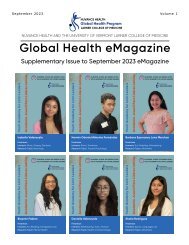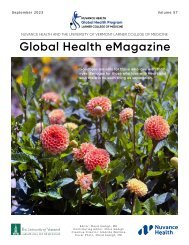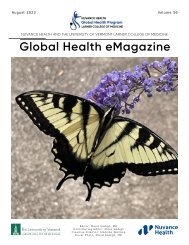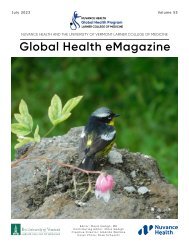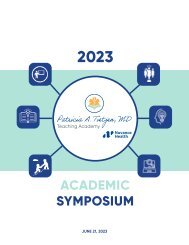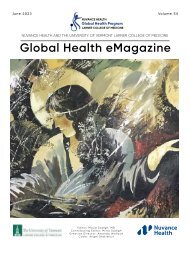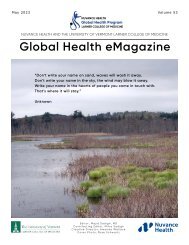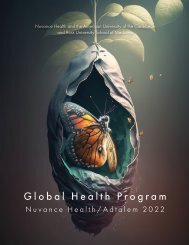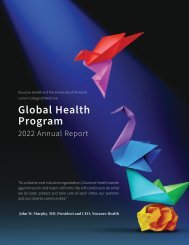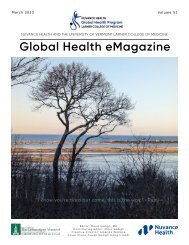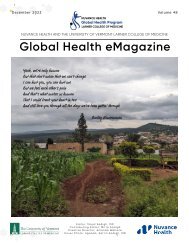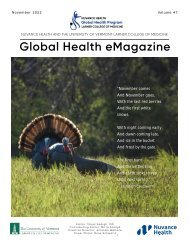eMagazine April 2023
Create successful ePaper yourself
Turn your PDF publications into a flip-book with our unique Google optimized e-Paper software.
OUR PEOPLE,<br />
OUR MISSION<br />
Global Health<br />
<strong>eMagazine</strong><br />
<strong>April</strong> <strong>2023</strong><br />
Perspectives<br />
Reports from the Field<br />
Highlights<br />
Reflections<br />
Nursing Division<br />
Women’s Health Education<br />
Hispanic/Latinx Community<br />
Ugandan Voices<br />
Innovation and Technology<br />
Our Beautiful Planet<br />
Art to Remind Us of<br />
Who We Can Be<br />
Video of the Month<br />
Announcement<br />
New Publications<br />
Article of the Month<br />
Welcome<br />
Among the Letters<br />
Congratulations<br />
Photo News<br />
Calendar<br />
Global Health Family<br />
Resources<br />
Previous Issues of<br />
the <strong>eMagazine</strong><br />
Section Editor:<br />
Nursing Division<br />
Catherine G Winkler, PhD, MPH, APRN-BC<br />
Director of the Nuvance Health Global Health Program Nursing Division<br />
Compassionate Care Course<br />
for Nurses<br />
Written by<br />
Rebecca Nagle, DNP, APRN, PNP<br />
and<br />
Lili Martin, DNP, RN, PCCN<br />
Dr. Rebecca Nagle (left) and Dr. Lili Martin (right) are both Clinical Assistant<br />
Professors of Nursing at the University of Vermont College of Nursing and Health<br />
Sciences in Burlington, Vermont and are affiliates of the University of Vermont’s<br />
Osher Center for Integrative Health<br />
In addition to the everyday stressors that college students experience, nursing<br />
students are faced with unique clinical, academic, and personal stressors related<br />
to nursing. Clinical stressors include a fear of being unprepared, of making<br />
mistakes, witnessing death, and dying, and interpersonal interactions with<br />
instructors and providers. Academic stressors include rigorous National Council<br />
Licensure Examination (NCLEX)-style exams, and requirements to maintain a<br />
specific GPA (Bartlett et al., 2016; Chernomas & Shapiro, 2013; Thomas & Revell,<br />
2016).<br />
It is well documented that unmanaged stress can lead to negative outcomes<br />
for nurses and patients including increased risk for medical errors, job burnout,<br />
turnover rates, and significantly higher rates of suicide in nurses compared to the<br />
general public. The COVID-19 pandemic exacerbated these stressors by placing<br />
additional burden on nursing students and nurses (American Nurses Foundation,<br />
2022; Cuccia et al., 2022; Drybye et al. 2017; Firth, 2019). In addition to necessary<br />
organizational and systems change, nursing schools have a duty to educate<br />
students about tools that can be utilized to effectively manage stress before<br />
they enter the workforce.<br />
Drs. Nagle and Martin created the nursing course, Compassionate Care for<br />
Nurses at the University of Vermont College of Nursing and Health Sciences to<br />
combat nursing student stress and provide students with tools to optimize their<br />
mental health. The course challenges students to explore how stress affects<br />
mental health and well-being while participating in a variety of integrative<br />
strategies including meditation and mindfulness, narrative medicine, yoga, tai<br />
chi, forest bathing, culinary medicine, and Reiki. The experiential classroom<br />
is geared towards optimizing nursing students and nurses’ mental health and<br />
wellbeing increasing compassion in the care they give their patients, families<br />
Nursing continued on next page >><br />
13




